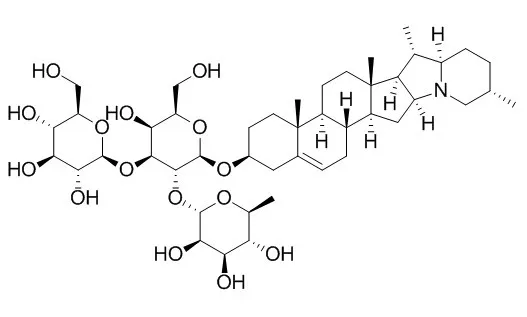| In vitro: |
| PLoS One. 2014 Feb 5;9(2):e87868. | | Antitumor efficacy of α-solanine against pancreatic cancer in vitro and in vivo.[Pubmed: 24505326] | alpha-Solanine, a steroidal glycoalkaloid in potato, was found to have proliferation-inhibiting and apoptosis-promoting effect on multiple cancer cells, such as clone, liver, melanoma cancer cells. However, the antitumor efficacy of alpha-Solanine on pancreatic cancer has not been fully evaluated.
METHODS AND RESULTS:
In this study, we inquired into the anti-carcinogenic effect of alpha-Solanine against human pancreatic cancer cells. In the present study, we investigated the anti-carcinogenic effect of alpha-Solanine against human pancreatic cancer cells. In vitro, alpha-Solanine inhibited proliferation of PANC-1, sw1990, MIA PaCa-2 cells in a dose-dependent manner, as well as cell migration and invasion with atoxic doses. The expression of MMP-2/9, extracellular inducer of matrix metalloproteinase (EMMPRIN), CD44, eNOS and E-cadherin were suppressed by alpha-Solanine in PANC-1 cells. Moreover, significantly decreased vascular endothelial growth factor (VEGF) expression and tube formation of endothelial cells were discerned following alpha-Solanine treatment. Suppressed phosphorylation of Akt, mTOR, and Stat3, and strengthen phosphorylation of β-catenin was found, along with markedly decreased tran-nuclear of NF-κB, β-catenin and TCF-1. Following the administration of alpha-Solanine (6 µg/g for 2 weeks) in xenograft model, tumor volume and weight were decreased by 61% and 43% (p<0.05) respectively, showing decreased MMP-2/9, PCNA and VEGF expression.
CONCLUSIONS:
In conclusion, alpha-Solanine showed beneficial effects on pancreatic cancer in vitro and in vivo, which may via suppressing the pathway proliferation, angiogenesis and metastasis. | | Exp Ther Med . 2016 Sep;12(3):1525-1530. | | Inhibitory effect of α-solanine on esophageal carcinoma in vitro[Pubmed: 27588073] | | Abstract
α-solanine, a bioactive component and one of the major steroidal glycoalkaloids in potatoes, has been observed to inhibit growth and induce apoptosis in cancer cells. However, the antitumor efficacy of α-solanine on esophageal carcinoma has yet to be fully elucidated. In the present study, the antitumor efficacy of α-solanine against human esophageal carcinoma cells was investigated. It was determined that α-solanine inhibited the growth and proliferation of human esophageal EC9706 and Eca109 cancer cells in a dose-dependent manner, as well as the cell migration and invasion. In addition, the apoptotic rate was increased in the cancer cells treated with α-solanine in a dose-dependent manner, compared with that of the control group (P<0.05). The expression levels of tumor metastasis-related proteins, including matrix metalloproteinase (MMP)-2 and MMP-9, were reduced in the cells treated with α-solanine, as compared with the control group. Conversely, significantly higher expression levels of E-cadherin were detected in the α-solanine-treated groups, as compared with the control group (P<0.05). Therefore, the current results provide a novel insight into the anti-tumor mechanism of α-solanine, and suggest that α-solanine is a potential agent for the prevention and treatment of esophageal carcinoma.
Keywords: apoptosis; esophageal carcinoma; proliferation; tumor metastasis; α-solanine. |
|
| In vivo: |
| Arch Insect Biochem Physiol. 2014 Sep;87(1):26-39. | | Potato leaf extract and its component, α-solanine, exert similar impacts on development and oxidative stress in Galleria mellonella L.[Pubmed: 25041927] |
METHODS AND RESULTS:
The glycoalkaloid alpha-Solanine. Wax moth larvae were reared from first instar on a diet supplemented with three concentrations of EPL or alpha-Solanine. Both EPL and alpha-Solanine affected survivorship, fecundity, and fertility of G. mellonella to approximately the same extent. We evaluated the effect of EPL and alpha-Solanine on oxidative stress in midgut and fat body by measuring malondialdehyde (MDA) and protein carbonyl (PCO) contents, both biomarkers of oxidative damage. We evaluated glutathione S-transferase (GST) activity, a detoxifying enzyme acting in prevention of oxidative damage. EPL and alpha-Solanine altered MDA and PCO concentrations and GST activity in fat body and midgut.
CONCLUSIONS:
We infer that the influence of EPL on G. mellonella is not enhanced by synergistic effects of the totality of potato leaf components compared to alpha-Solanine alone. | | Arch Insect Biochem Physiol. 2013 May;83(1):15-24. | | The influence of dietary α-solanine on the waxmoth Galleria mellonella L.[Pubmed: 23494897] | Plant allelochemicals are nonnutritional chemicals that interfere with the biology of herbivores.
METHODS AND RESULTS:
We posed the hypothesis that ingestion of a glycoalkaloid allelochemical, α-solanine, impairs biological parameters of greater wax moths Galleria mellonella. To test this idea, we reared wax moths on artificial diets with 0.015, 0.15, or 1.5 mg/100 g diet of α-solanine. Addition of α-solanine to the diet affected survival of seventh-instar larvae, pupae, and adults; and female fecundity and fertility. The diet containing the highest α-solanine concentration led to decreased survivorship, fecundity, and fertility. The diets supplemented with α-solanine led to increased malondialdehyde and protein carbonyl contents in midgut and fat body and the effect was dose-dependent. Dietary α-solanine led to increased midgut glutathione S-transferase activity and to decreased fat body glutathione S-transferase activitiy.
CONCLUSIONS:
We infer from these findings that α-solanine influences life history parameters and antioxidative enzyme activities in the midgut and fat body of G. mellonella. |
|






 Cell. 2018 Jan 11;172(1-2):249-261.e12. doi: 10.1016/j.cell.2017.12.019.IF=36.216(2019)
Cell. 2018 Jan 11;172(1-2):249-261.e12. doi: 10.1016/j.cell.2017.12.019.IF=36.216(2019) Cell Metab. 2020 Mar 3;31(3):534-548.e5. doi: 10.1016/j.cmet.2020.01.002.IF=22.415(2019)
Cell Metab. 2020 Mar 3;31(3):534-548.e5. doi: 10.1016/j.cmet.2020.01.002.IF=22.415(2019) Mol Cell. 2017 Nov 16;68(4):673-685.e6. doi: 10.1016/j.molcel.2017.10.022.IF=14.548(2019)
Mol Cell. 2017 Nov 16;68(4):673-685.e6. doi: 10.1016/j.molcel.2017.10.022.IF=14.548(2019)